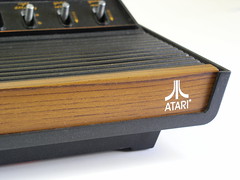When I was a kid, my dad threatened to throw my Nintendo off of the balcony of the condo where we were living. I can’t say I blamed him. An eminently practical man who made his living farming, he couldn’t stand the idea of electronic entertainment. So when he came home one day to find me clutching a controller in a room with the shades drawn against the sun, he blew a gasket. “You’re just sitting there like a goon in front of that box!” he exclaimed. “It’s a goon box, and I’m going to throw it out the window if you don’t go outside!” I’ll wager that I’m not the only individual of my generation whose parents just didn’t get the idea of video games. But to many children of the eighties, they were a cultural influence every bit as potent as Elvis or the Apollo landing. And it’s for those individuals that I suspect Ernest Cline penned his debut cyberpunk novel Ready Player One.
You wouldn’t say Wade Owen Watts’ world is in decline. Rather, you’d say it’s a semi plummeting down Pikes Peak with its brake lines cut. The worst part? Everybody knows it, which is why OASIS has become so popular. OASIS is essentially Second Life with spells and lasers, a virtual universe studded with planetoids upon which the impossible is commonplace. In OASIS, Wade isn’t some pale, chubby teenager. He’s Parzival, a medieval warrior who goes about killing monsters. OASIS was created by one James Halliday, a neurotic programming genius whose only solace in life was consuming copious amounts of eighties media. A multibillionaire at the time of his death, Halliday pledged his fortune to whoever could find an Easter Egg (or secret content) within the virtual world, a treasure whose location is hidden in cultural references so obscure that egg hunters (a.k.a. gunters) keep encyclopedic cross-referenced commonplace books filled with trivia. The virtual arms race has been going on for five long years with gunters battling the corrupt corporate drones of conglomerate Innovative Online Industries. What no one realizes is that Wade himself in going to stumble over the first clue to Halliday’s fortune almost entirely by accident.
There’s a reason why Crown Publishers put a blurb by Charlaine Harris (whose Sokie Stackhouse novels inspired HBO’s True Blood) at the top of the hardcover I read. (“This non-gamer loved every page of Ready Player One.”) The marketers obviously didn’t want Cline’s first book to be pigeonholed as a geeky nostalgic exercise. True, the book is more than that. Cline makes Wade into more or less a fully realized character with all the hopes and frustrations, dreams and despondencies, achievements and agonies that you’d expect from a teen in a high-tech, opportunity-constrained context. The action also proves enjoyable, and the ending is a truly a nailbiter. But the people who’ll enjoy Ready Player One the most are those who dig obsessively detailed descriptions of Atari-era videogames, Dungeons & Dragons, and virtual combat. Cline also goes all-in with cyberpunk tropes, filling the proceedings with online hijinks, crumbling urban cores, and a corporation so WrongBadUnGood that it’s comical. I don’t see how you could imagine Ready Player One is anything but a niche title. But it’s still a darn enjoyable one for all that.
(Picture: CC 2009 by moparx)
Saturday, June 6, 2015
Subscribe to:
Post Comments (Atom)



No comments:
Post a Comment